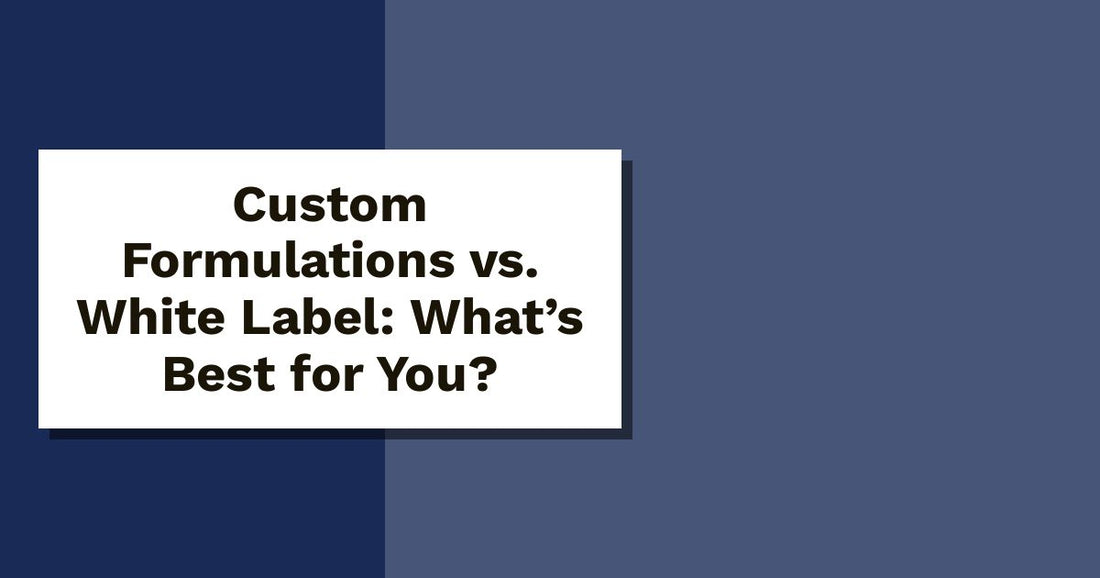In today's fast-paced market, businesses face a crucial decision when it comes to product development. Should they opt for custom formulations or go with white label products? Making the right choice can shape your brand's identity and success. Let’s dive into the nuances of each option to help you decide which path is best for your business.
Understanding Custom Formulations
What Are Custom Formulations?
Custom formulations allow businesses to create products tailored to their specific needs. This involves working closely with manufacturers to design unique blends that meet precise specifications. Whether it’s a skincare product or a dietary supplement, custom formulations enable companies to stand out with exclusive offerings.
Benefits of Custom Formulations
Custom formulations bring several advantages:
- Unique Branding: Crafting a product from scratch allows you to create a distinct brand identity. It’s like designing a bespoke suit; it fits perfectly and reflects personal style.
- Quality Control: You have full control over the ingredients and processes, ensuring top-notch quality. Think of it as home-cooked meals versus fast food.
- Market Differentiation: Custom products can address niche markets, giving you an edge over competitors who offer generic items. It’s akin to a chef creating a signature dish that diners can’t find anywhere else.
Challenges of Custom Formulations
Despite their allure, custom formulations come with challenges:
- Higher Costs: Developing unique products can be expensive. It’s like building a custom home versus buying a pre-fabricated one.
- Longer Development Time: Crafting custom products takes time, from research to testing and final production. Imagine the difference between planting a garden and buying flowers from the store.
- Complex Regulatory Compliance: Ensuring that your custom products meet all regulatory requirements can be daunting. This is similar to navigating the legalities of patenting an invention.
Exploring White Label Products
What Are White Label Products?
White label products are pre-made items that companies can rebrand and sell as their own. These products are ready-made, requiring minimal customization. Common in various industries, they offer a quick way to enter the market.
Advantages of White Label Products
White label products offer numerous benefits:
- Cost-Effectiveness: Purchasing pre-made items is often cheaper than developing custom formulations. It’s like buying a pre-assembled piece of furniture versus custom-building one.
- Faster Time-to-Market: These products are ready to go, allowing for a swift market launch. Think of it as buying a ready-to-eat meal versus cooking from scratch.
- Ease of Launch: The simpler production and regulatory processes make it easier to start selling. It’s akin to moving into a turnkey home where everything is already set up.
Drawbacks of White Label Products
However, white label products do come with some disadvantages:
- Limited Customization: You’re working within the constraints of pre-made formulas. It’s like choosing from a menu rather than crafting your own recipe.
- Dependency on Suppliers: Your success hinges on the reliability of your supplier. If they falter, your business may suffer. This is similar to relying on a single source for raw materials.
- Competitive Pressures: Many businesses might sell similar or identical products, increasing competition. It’s like running in a race where everyone has the same shoes.
Choosing Between Custom Formulations and White Label
Assessing Your Business Needs
To decide which is better for your business, consider your goals, budget, and timeline. If establishing a unique brand identity is paramount, custom formulations might be the way to go. However, if you need to launch quickly and economically, white label products could serve you better. Think of it as choosing between crafting a masterpiece and opting for a ready-to-hang painting.
Industry Considerations
Different industries have unique demands that could influence your choice. For instance, in the beauty sector, a custom formulation can set you apart. In contrast, tech accessories might benefit more from white label options due to rapid market changes. It’s like choosing a vehicle; what works for a city might not be ideal for off-roading.
Case Studies and Examples
- Custom Formulations: A local skincare brand became a sensation by using unique, locally-sourced ingredients. This set them apart and built a loyal customer base.
- White Label Products: An online retailer quickly expanded by selling high-quality, ready-made electronics under their own brand. This allowed them to focus on marketing and customer service rather than product development.
Conclusion
Choosing between custom formulations and white label products depends on your specific business needs, goals, and industry landscape. Both options have their merits and drawbacks, much like choosing between bespoke tailoring and off-the-rack clothing. Assess your situation carefully and make a choice that aligns with your vision and capabilities. Your decision can shape your brand’s future and define your place in the market. Choose wisely.

